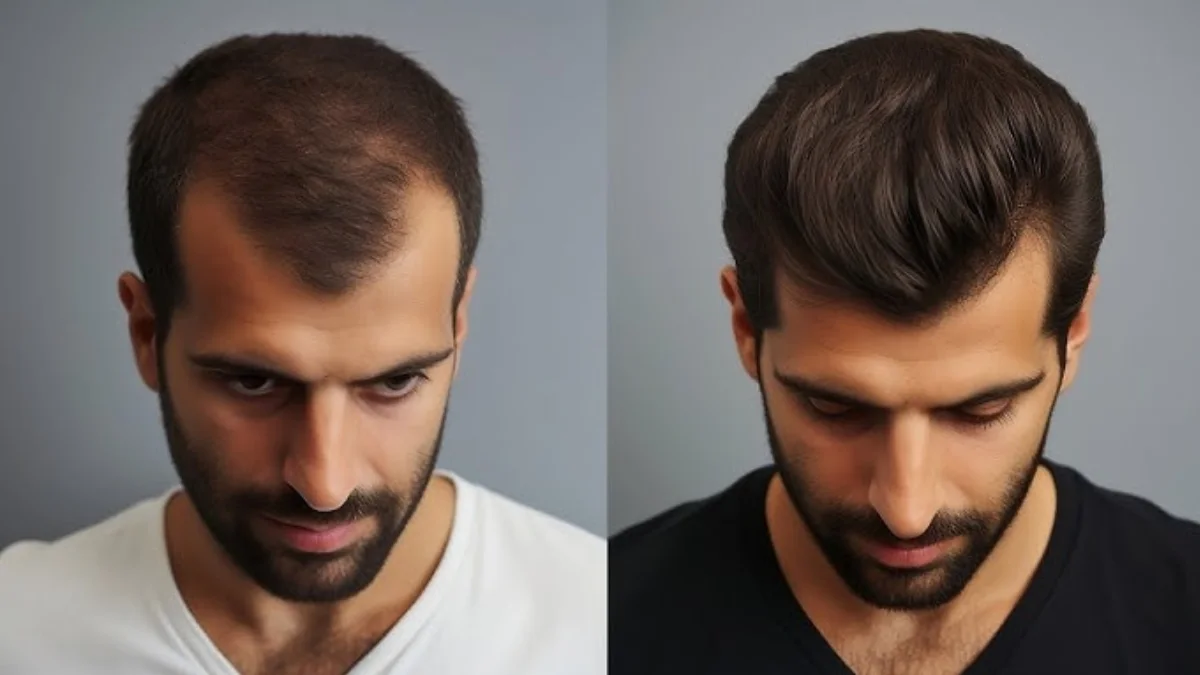
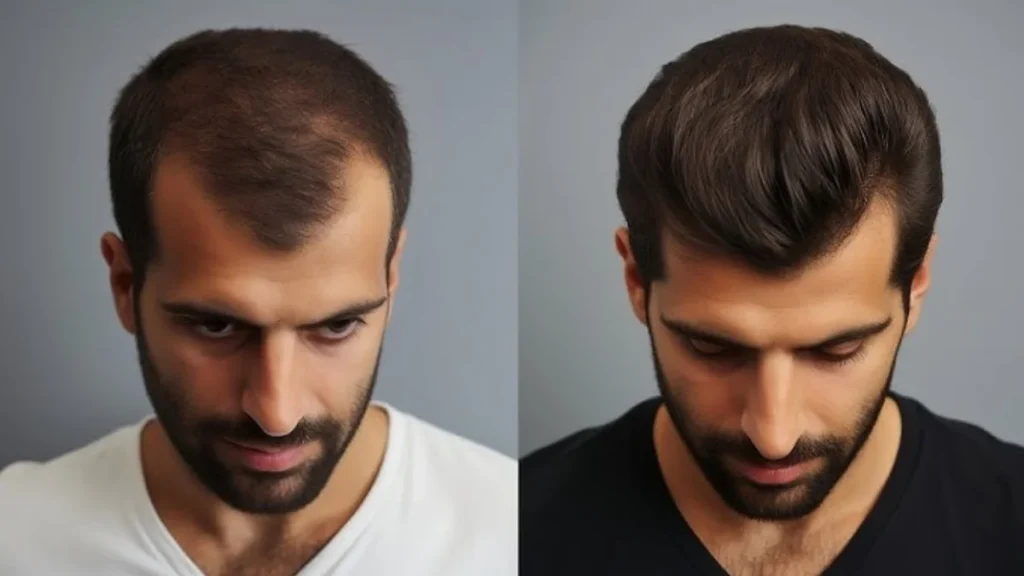
Hair Loss Treatment: Hair loss is a common condition that affects millions of people worldwide, causing emotional distress and impacting self-esteem. Whether you’re experiencing the early signs of male pattern baldness, thinning hair, or sudden hair loss, it’s crucial to address the issue early on. In this guide, we’ll explore various hair loss treatments, from medications to advanced surgical procedures, and provide tips on how to manage and prevent hair loss effectively.
Book Your Consultation Today
Visit Dr. Hanan Dermatology Specialty Clinic in Padur, OMR, Chennai. Schedule your consultation today and start your journey to fuller, healthier hair.
For more information and to book your appointment, visit our clinic or call us at the clinic’s contact details.
What is Hair Loss?
Hair loss, or alopecia, is a condition where an individual sheds more hair than usual, leading to noticeable thinning or bald patches. On average, it’s normal to lose around 50-100 strands of hair per day. However, excessive hair loss occurs when the hair fails to regrow at the same rate, leading to thinning or baldness.
Hair loss can affect anyone, regardless of age or gender. It may occur on the scalp, face, or body, and the causes of hair loss vary from genetics to medical conditions, lifestyle factors, and hormonal changes.
Common Causes of Hair Loss
Understanding the root cause of your hair loss is essential for determining the best treatment option. Some of the most common causes of hair loss include:
- Genetics (Androgenic Alopecia): Hereditary hair loss is one of the most common causes of thinning hair. This condition is often referred to as male or female pattern baldness.
- Hormonal Changes: Pregnancy, childbirth, menopause, and other hormonal shifts can contribute to temporary or permanent hair loss.
- Medical Conditions: Autoimmune diseases, thyroid disorders, and other health issues can lead to hair loss.
- Stress and Lifestyle Factors: Physical or emotional stress can lead to a type of hair loss called telogen effluvium, where hair falls out rapidly after stressful events.
- Medications: Certain treatments, such as chemotherapy, may cause hair loss as a side effect.
Types of Hair Loss
There are several types of hair loss, each with its own underlying causes and treatment options:
- Androgenic Alopecia: This is the most common form of hair loss and can affect both men and women. It typically results in a receding hairline for men and thinning hair all over the head for women.
- Alopecia Areata: This autoimmune condition causes hair to fall out in small, round patches, often on the scalp.
- Telogen Effluvium: This temporary hair loss occurs after physical or emotional stress and is often seen a few months after an event like surgery or significant life changes.
- Anagen Effluvium: This rapid hair loss usually occurs as a side effect of chemotherapy or other medical treatments.
- Scarring Alopecia: Inflammatory conditions cause permanent hair loss by damaging hair follicles and replacing them with scar tissue.
Non-Surgical Hair Loss Treatments
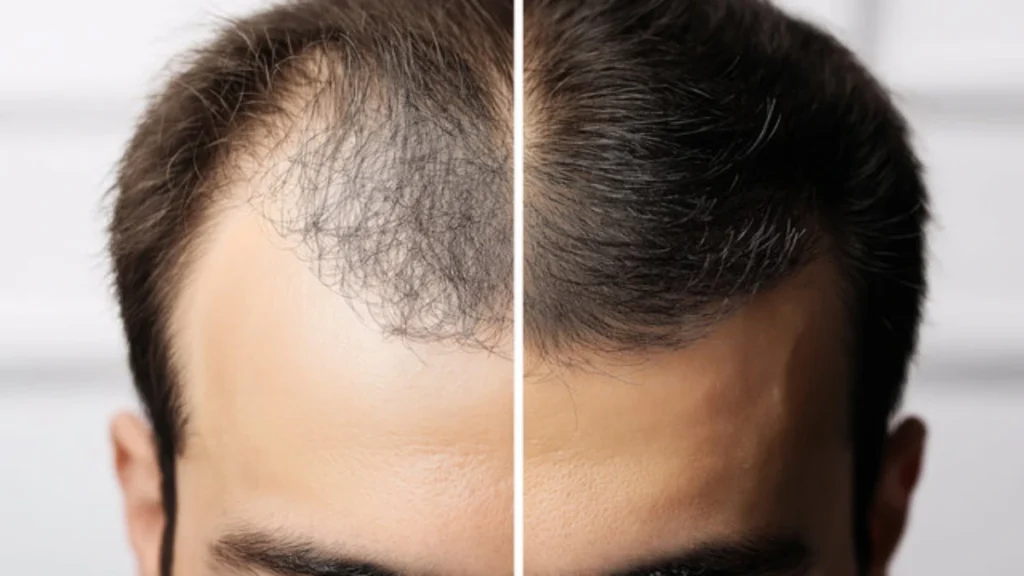
1. Medications
- Minoxidil (Rogaine®): Minoxidil is a topical solution that is widely used to treat androgenic alopecia. It stimulates hair growth and slows the rate of hair loss. Available over the counter, it’s suitable for both men and women.
- Finasteride (Propecia®): This oral medication is commonly prescribed for men with male pattern baldness. It works by blocking the hormone dihydrotestosterone (DHT), which is responsible for hair follicle shrinkage in androgenic alopecia.
2. Platelet-Rich Plasma (PRP) Therapy
- What It Is: PRP therapy involves drawing blood from your body, processing it to concentrate the platelets, and injecting it into your scalp. This method promotes hair growth by stimulating hair follicles.
- Benefits: PRP therapy is beneficial for individuals experiencing early stages of hair loss, and it can help regrow hair and slow down the progression of hair thinning.
3. Low-Level Laser Therapy (LLLT)
- How It Works: LLLT uses light to stimulate hair follicles and improve scalp circulation. Devices like laser combs, helmets, and caps are FDA-approved for treating hair loss.
- Effectiveness: This treatment is non-invasive, safe, and effective for some individuals, especially those in the early stages of hair thinning.
4. Topical Corticosteroids
- Usage: For autoimmune-related hair loss like alopecia areata, corticosteroid creams or injections can be applied to the scalp to reduce inflammation and promote hair regrowth.
Read more: Benefits of Hair Transplant A Permanent Solution for Hair Loss
Surgical Hair Loss Treatments
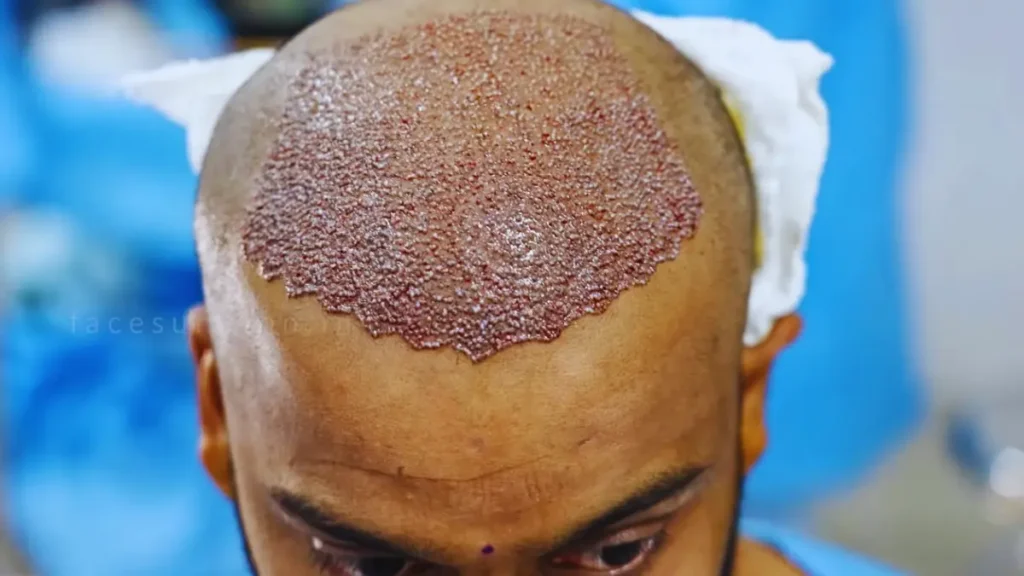
1. Hair Transplant Surgery
- Follicular Unit Extraction (FUE): In FUE, hair follicles are extracted from thicker areas of the scalp and transplanted into thinning or balding areas. The procedure leaves minimal scarring and provides natural results.
- Follicular Unit Transplantation (FUT): FUT involves removing a strip of skin from the donor area and then dividing it into grafts for transplantation. It’s typically more invasive than FUE but can be more suitable for those requiring a large number of grafts.
2. Scalp Reduction Surgery
- What It Is: Scalp reduction involves surgically removing sections of bald skin and pulling the remaining scalp to cover the area. This procedure is used in cases of extensive baldness.
3. Hair Cloning
- Emerging Technology: Hair cloning is a new research area where scientists aim to clone hair follicles to treat hair loss. Though not widely available, it’s a promising future solution.
Read more: Hair Follicle Surgery A Complete Guide to Hair Restoration
Home Remedies and Natural Treatments
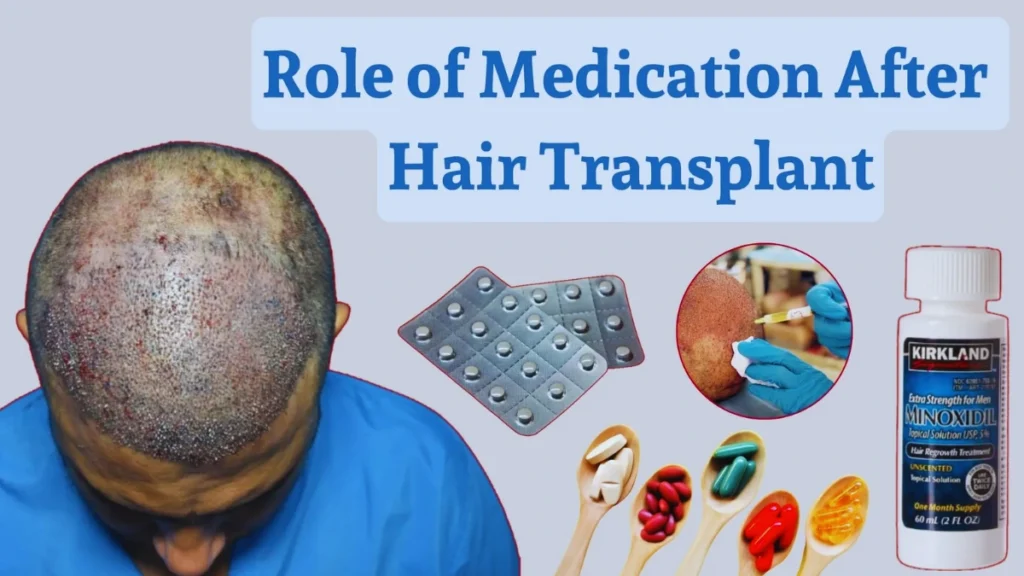
For those seeking natural remedies, several options may help promote healthier hair:
- Herbal Oils: Oils like castor oil, rosemary oil, and peppermint oil are believed to improve circulation and promote hair regrowth. While the effectiveness of these oils varies, many people find them helpful for maintaining healthy hair.
- Dietary Supplements: Biotin, iron, vitamin D, and other nutrients are essential for healthy hair. Deficiencies in these nutrients can lead to hair loss, so adding them to your diet can help improve hair health.
- Scalp Massages: Regularly massaging the scalp with essential oils or natural oils can increase blood circulation to hair follicles, which may encourage hair growth.
Read more: Medicine After Hair Transplant Essential Post-Operative Care for Optimal Results
Preventive Measures to Reduce Hair Loss
While some hair loss is inevitable, there are steps you can take to minimize further damage:
- Eat a Healthy Diet: A balanced diet rich in protein, iron, and essential vitamins supports hair health and minimizes hair loss.
- Avoid Tight Hairstyles: Styles that pull on the hair, like braids and tight ponytails, can lead to traction alopecia, a type of hair loss caused by constant tension on the hair.
- Protect Your Hair from Damage: Minimize the use of heat styling tools and harsh chemical treatments. Always use heat protectants when styling.
When to Seek Professional Help
If you’re experiencing excessive hair shedding, patches of baldness, or other unusual symptoms, it’s important to consult a healthcare provider. They may recommend diagnostic tests to identify the underlying cause of your hair loss and suggest the best treatment plan.
The Emotional Impact of Hair Loss
Hair loss can have a significant emotional and psychological impact. It’s essential to seek support from loved ones or professional counselors if you’re struggling with the emotional side effects of hair loss. Additionally, options like wigs, hairpieces, or alternative styling techniques can help boost confidence.
Conclusion
Hair loss treatment varies greatly depending on the cause and severity of the condition. Whether you choose non-invasive options like medications and PRP therapy or more permanent solutions such as hair transplant surgery, there are effective treatments available. It’s essential to consult with a healthcare provider to find the best approach tailored to your specific needs. With the right treatment and care, you can successfully manage hair loss and restore your confidence.


[…] confidence and well-being. Fortunately, India offers a plethora of effective treatments to combat hair loss. In this article, we’ll explore the causes, diagnostic methods, and treatments available in India […]
[…] to a variety of oils made from natural ingredients specifically designed for Black and textured hair types. These oils, such as Jamaican black castor oil and black seed oil, are packed with nourishing […]